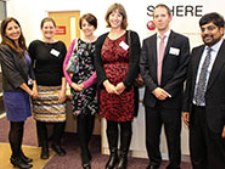Dec 24 2013
An innovative new health project which could help save lives by detecting and preventing medical conditions in the home was officially launched last week at the University of Bristol.
 Right to left: Professor Nishan Canagarajah and Professor Ian Craddock (University of Bristol); Dr Vivienne Blackstone, Dr Annette Bramley and Dr Hannah Maytum (EPSRC); Patricia Holley (SPHERE Project Manager)
Right to left: Professor Nishan Canagarajah and Professor Ian Craddock (University of Bristol); Dr Vivienne Blackstone, Dr Annette Bramley and Dr Hannah Maytum (EPSRC); Patricia Holley (SPHERE Project Manager)
The £12 million Sensor Platform for Healthcare in a Residential Environment (SPHERE) project will develop a system of sensors for homes which could, for example, spot overnight or mini-strokes by noticing small changes in behaviour or expression.
It could also be used at home as an early warning system to prevent long-term health conditions such as heart disease, dementia and diabetes as well as depression and obesity. The sensors could also benefit the older population by helping to prevent falls.
The five-year project is an Interdisciplinary Research Collaboration (IRC) funded by the Engineering and Physical Sciences Research Council (EPSRC) and led by the University of Bristol, together with the Universities of Southampton and Reading.
They are working with industrial partners Toshiba and IBM, and with Bristol City Council and Knowle West Media Centre, the latter of which will be leading on the community engagement for the project.
Director of SPHERE, Professor Ian Craddock in the Department of Electrical and Electronic Engineering at Bristol, said: “This exciting new project will revolutionise healthcare in the home.
“Researchers will work hand in hand with the public and healthcare providers to create a system that is user-friendly – and look at both the benefits and concerns associated with this type of technology. The project is currently looking for people to join its public advisory group.”
The involvement of patients, carers, nurses and clinicians from the outset of this project will be essential to make sure the exciting new technologies are accepted. Once they have been developed further they will be piloted in a large number of homes over extended periods of time.
Professor William Harwin in the School of Systems Engineering at the University of Reading said that a key part of the project will be producing ‘passive sensors’.
He explained: “These sensors could be embedded in clothing or jewellery, or – more ambitiously – implanted, possibly in association with remedial surgery.”
The University of Southampton has UK-leading expertise and lab facilities for studying movement in stroke and Parkinson’s disease rehabilitation, and also conducts research into falls and impaired balance.
Professor of Rehabilitation at the University of Southampton, Ann Ashburn, said: “We have limited knowledge of the ways in which individuals move about, negotiate obstacles and on some occasions become unsteady and fall over in their homes. This exciting research opportunity will allow us to detect these situations and make major contributions to fall prevention among the older population.”
More information is available in the announcement of funding published in May 2013.
Anyone interested in taking part or finding out more about the project should email [email protected] or visit www.irc-sphere.ac.uk.
Source: http://www.bristol.ac.uk/